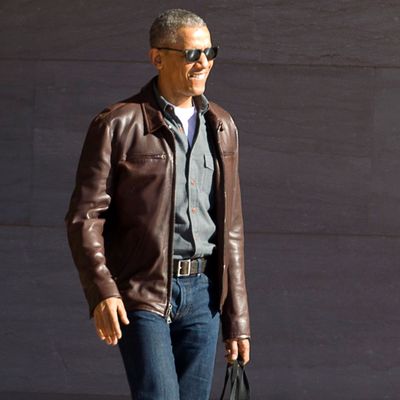
One of the many perks of being a former president is that publishing houses will pay you millions of dollars to write (or hire someone to write) your memoirs, while corporations will happily hand you great gobs of money to talk into a microphone for an hour.
And if you happen to be the singularly charismatic, globally beloved, first former black president, that publishing contract will be a record $65 million; that speaking fee will be a whopping $400,000; and Richard Branson will even let you onto his boat.
But then, if you are Barack Obama, the world’s most powerful spokesman for pragmatic, center-left governance, should you collect on all your prizes? More specifically, at a time when populists the world over are seeking to tar liberal technocrats as the bought-and-paid-for puppets of special interests, should Obama have risked tainting his creed by accepting nearly twice his presidential pension to speak at a Wall Street firm’s conference this fall?
Vox’s Matt Yglesias thinks not:
[A] crucial vulnerability of center-left politics around the world is that their sincere conviction — a faith in the positive-sum nature of cosmopolitan values and appropriately regulated forms of global capitalism, tempered by a welfare state — is easily mistaken for corruption…This approach has a lot of political and substantive merits. But it is invariably subject to the objection: really?
Did you really avoid breaking up the big banks because you thought it would undermine financial stability, or were you on the take? Did you really think a fracking ban would be bad for the environment, or were you on the take? One man’s sophisticated and pragmatic approach to public policy can be the other man’s grab bag of corrupt opportunism.
Leaders who sincerely care about the fate of the progressive center as a nationally and globally viable political movement need to push back against this perception by behaving with a higher degree of personal integrity than their rivals — not by accepting the logic that what’s good for the goose is good for the gander.
This makes sense. Although, it is worth noting that there are significant differences between Obama racking up Wall Street speaking fees in 2017 and Hillary Clinton doing the same three years earlier. Obama is not going to create a huge unnecessary liability for his 2020 campaign by accepting $400,000 from Cantor Fitzgerald. And it’s harder to read the financial firm’s investment in Obama as a down payment for access to a future White House, given that he, unlike Clinton in 2014, appears to have little interest in resuming formal public service.
But still, Obama does not need this gig. And both his party — and his ideological kin the world over — could really use some distance from Wall Street, given that even the center-left’s own technocrats now recognize that the financial industry is an overgrown parasite whose rapacious rent-seeking immiserates working people.
That said, there may be an argument for Obama milking his appeal as a paid speaker to redistribute millions of dollars away from Wall Street firms and into the coffers of GiveDirectly, the Deworm the World Initiative, or the Eric Levitz Fund for Millennial Journalists Who Would Like a Big-Ass Smart TV.






























